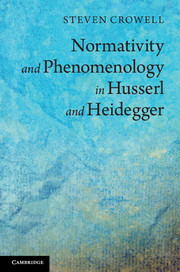Book contents
- Frontmatter
- Contents
- Acknowledgments
- Citation conventions for the works of Husserl and Heidegger
- Introduction
- Part I Transcendental philosophy, phenomenology, and normativity
- Part II Husserl on consciousness and intentionality
- Part III Heidegger, care, and reason
- Part IV Phenomenology and practical philosophy
- 11 The existential sources of normativity
- 12 Husserl and Heidegger on the intentionality of action
- 13 Heidegger on practical reasoning, morality, and agency
- References
- Index
12 - Husserl and Heidegger on the intentionality of action
Published online by Cambridge University Press: 05 April 2013
- Frontmatter
- Contents
- Acknowledgments
- Citation conventions for the works of Husserl and Heidegger
- Introduction
- Part I Transcendental philosophy, phenomenology, and normativity
- Part II Husserl on consciousness and intentionality
- Part III Heidegger, care, and reason
- Part IV Phenomenology and practical philosophy
- 11 The existential sources of normativity
- 12 Husserl and Heidegger on the intentionality of action
- 13 Heidegger on practical reasoning, morality, and agency
- References
- Index
Summary
Practical philosophy and the crisis
If practical philosophy is that branch of philosophy which analyzes the nature of action, then both Husserl and Heidegger provide elements for a practical philosophy, since both of them offer a phenomenology of action. But practical philosophy also has a normative dimension, concerned with the question of what I ought to do, and the two phenomenologists deal with this as well. The present chapter examines how Husserl and Heidegger conceive the fit between these two aspects of practical philosophy, and the conflicting estimations of the role of reason to which this leads.
For both Husserl and Heidegger, practical philosophy is inseparable from a philosophy of history. Because philosophy has a practical cultural role it must understand its own historical situation, and both Husserl and Heidegger see that situation as one of “crisis.” But while Husserl believes that the crisis calls for restoring “the genuine sense of rationalism,” in which reason governs not merely our technical-practical cognition of nature but our evaluative and practical lives as well (Hua 6, p. 14/16), Heidegger holds that the technization of reason is itself the outcome of that “genuine rationalism.” Thus, while Husserl’s phenomenology tends increasingly toward something like the “primacy of practical reason,” Heidegger’s itinerary is more complicated.
- Type
- Chapter
- Information
- Normativity and Phenomenology in Husserl and Heidegger , pp. 261 - 281Publisher: Cambridge University PressPrint publication year: 2013



